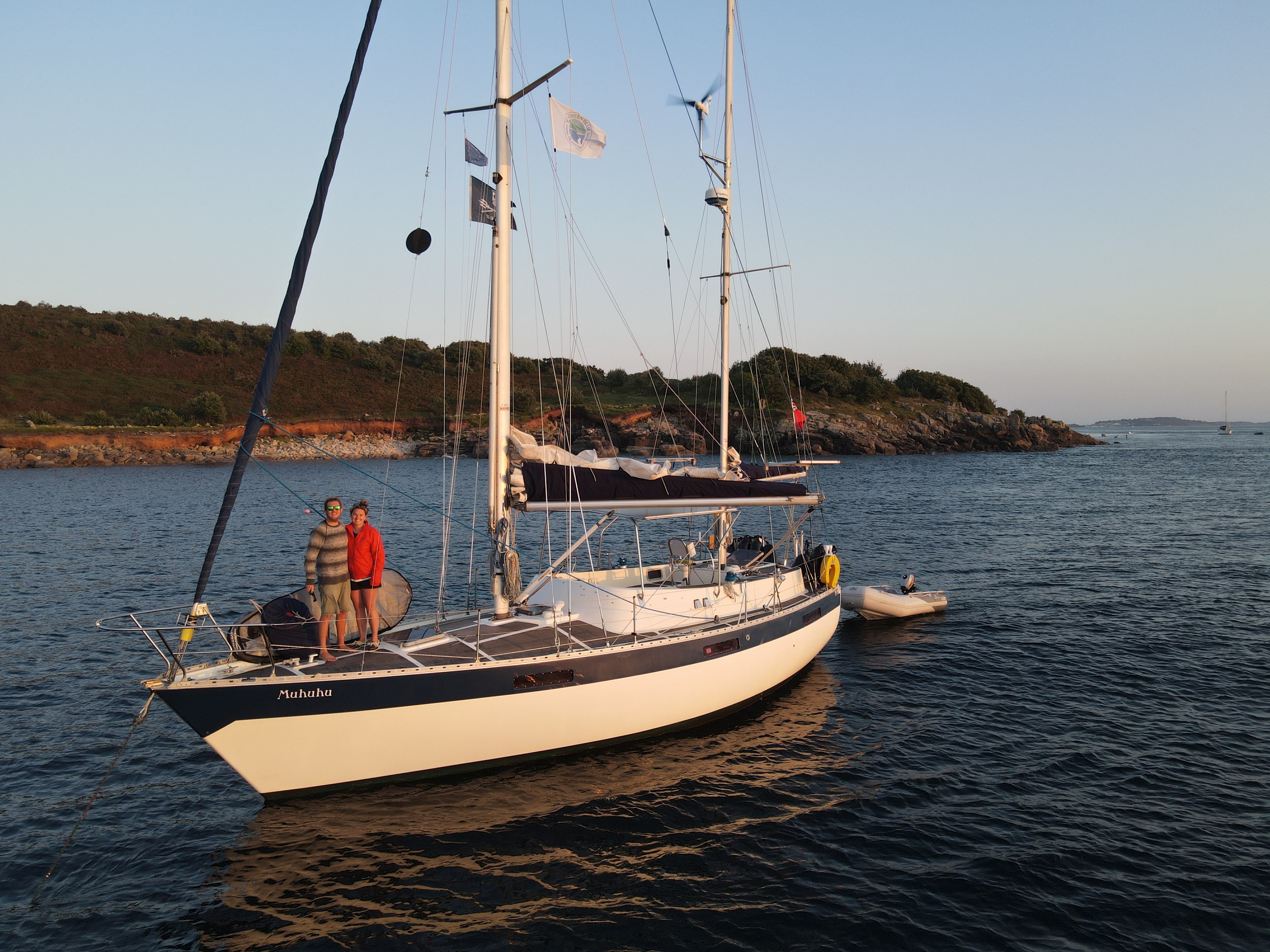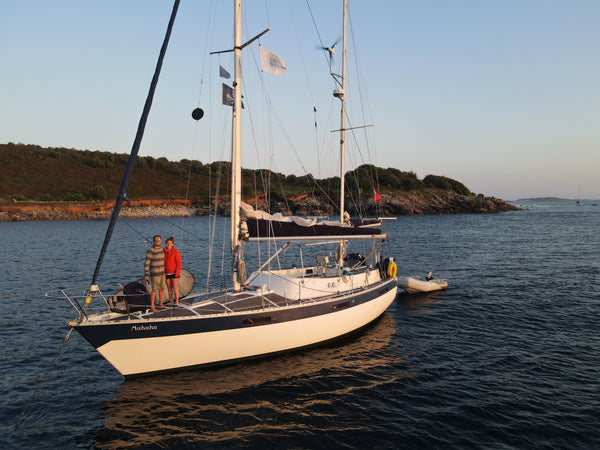
5 minutes with.... George and Sinead, the Electric Vagabonds

Hello Electric Vagabonds!
We know that our diesel engines aren’t great for our air or our seas, and electric power is an option for reducing the emissions, specifically
We’d love to know how you’ve been getting on so far, with your electric journey.
Tell us more!
- Firstly, tell us a bit about yourselves…
We’re George and Sinead. We live and work full-time on our boat, in pursuit of adventure, a low impact lifestyle, and a better world.
We’ve lived on board two and a half years, and owned the boat for two. Before this, we enjoyed the seasonaire lifestyle, working summers on beaches in the south of France and Turkey, and the Alps in winter.
We now work in engineering and conservation technology with North Devon Marine and SailElectric. The mission is to significantly reduce the impact we have on marine life, by influencing the shift to zero carbon, increasing ocean literacy, and progressing the tech needed for this.

- What kind of boat are you sailing and where are you heading?
Our home is an Oyster Mariner 35 sailing boat. The hull was moulded in 1982, and she was completed and launched in 1992. We converted her to electric propulsion in spring this year, as the engine needed a rebuild, and the engine bay and fuel system a complete refurb. We thought while we were taking the boat to pieces, we may as well make some improvements!
She’s now 100% emission free, powered by the wind and sun. She’s called Muhuhu, named after the species of wood from which her interior joinery is made - wood that was reclaimed from an old dance floor in the 80’s.
We are based in Plymouth and Falmouth for now, but sail all-round the west country, wherever work takes us, and wherever we want to explore when working remotely. This year so far, we’ve explored the South Coast, from Devon down to the Isles of Scilly. Before winter, we’ll sail up to North Devon, and on to Wales, stopping by Cardiff and Bristol on the way back.
The ultimate goal is to sail the world fossil fuel free, starting next year with a circumnavigation of the UK.
- What’s your mission with electric and why is this important?
Electric propulsion is a huge part of our goal to influence the shift to Net Zero, whether it be on land or at sea. Net Zero is urgently required to slow, and hopefully eventually reverse climate change. We as a species have had the technology to do this for a long time, but implementation has been too slow so far. The most recent IPCC report revealed how much there is still to be done, and how quickly we need to act, to avoid the worst affects of climate change.
We can all lead the way by creating positive change in our industry, proving technology and ethos that others can easily adopt.
Electric is important for this because we can power our economy on renewable energy from wind, solar and tidal energy.

We’ve been off-grid without diesel for over a month now, and we’ve sailed and motored over 260 nautical miles whilst exploring the south west, on just solar power and wind energy.
Over 80kWh of energy has been harvested by our main Solar array alone, which alongside the energy from our wind turbine, and regeneration from the prop whilst under sail, has supported us living and working onboard full-time. We’ve heated a tank of water every day, and charged laptops, phone, drones, cameras, all entirely without fossil fuels!
For the wider economy, green energy storage without the rare metals associated with batteries is the challenge, but there is great promise in our future fuel, Hydrogen, which can be carbon neutral if made using renewable energy.
Alongside transitioning to greener technologies, key points for achieving net zero are:
- Reduce consumption of everything. As a species we consume more than we need, and the wealthiest 10% of the world is responsible for around 49% of lifestyle consumption emissions!
- Reduce and eventually completely phase out fossil fuels.
- Reduce waste.
- Forge a future in which we can coexist sustainably alongside our ecosystems.
For us, proving that electric propulsion and renewable energy are viable technologies, alongside living a low impact lifestyle, is a great first step toward to accelerate the shift to greener technologies.
- Was there something specific that got you started, or has this been your dream all along?
I (George) always wanted to sail round the world, since I was a young kid. I learnt to sail on Shearwater lake and at West Wilts Youth Sailing Association in Wiltshire, and always wanted to sail bigger boats to far away places.
Sinead has always wanted to travel and work in marine conservation. When we met, we realised we both had a passion for travel and adventure, and a concern for nature and the future. We worked a few years together abroad, Sinead learnt to sail too, and the idea of living and travelling on a boat seemed to perfectly match our ethos, we didn’t like flying due to the environmental impact, (and the cost!), and we wanted to be able to take our home with us wherever we went.

George's parents were a great inspiration also, having sailed round the Atlantic Ocean, to the Caribbean, and recently sailing back across the Atlantic from Canada in an old wooden Hilyard ketch on which they’ve lived aboard for almost a decade.
We just loved the idea of the lifestyle, and it’s sent us down an exciting path so far!
- What’s the coolest thing you’ve seen or found out so far?
I think the interactions we have with people we encounter along the way has been the coolest thing. There’s been a whole mix of responses to our electric boat, it’s been fascinating and great fun to discuss North Devon Marine’s mission with so many people. It’s been positive, people are very open to the ethos, the ideas and the tech. There is an overwhelming sense of unity really, for the most part everyone agrees that we need urgent transformative change to secure a heathy future for us and for nature, and that we need worldwide direction and cooperation to create that. It’s created a real sense of optimism and hope, people know what we need to do, we just need to do it and get governments to act with us.
- Have there been any low points, what have you found the hardest to see so far?
The lowest Point was definitely two years after we returned from working abroad. We were working hard to save up for our boat, and in industries that we soon realised were far from perfect, and that played on our conscience a lot.
George was an engineer for a Luxury motor yacht builder in Poole, and was just totally demoralised after seeing the vast amount of waste that is created from large yacht production, and how much of that escapes the bins and skips. It was hard seeing things that were just ignored but have huge impact on our ecosystems - Like GRP being sanded without proper extraction, essentially clouds of microplastics entering the atmosphere everyday. Where does that end up?
It was a blunt reminder that no matter how many small changes we make at home for the environment, we also have responsibilities to change our industry, and that’s where drastic change is needed most.
After years trying desperately to change that from the inside, we realised we’d be able to have more of a positive impact leaving those companies and changing them from the outside instead.
And now I guess seeing plastic in the sea is hardest thing, but we’re armed with a boat, a long hook and a net, so at least now we can recover the bits we see!
- What do you find most difficult about being low-impact or around the water, yourselves?
Definitely reducing our plastic consumption. Both Plymouth and Falmouth have a few awesome plastic free stores, so we do the bulk of our shopping there whenever possible. But it’s more difficult for sure when we travel, so stocking up on plastic free dry stores before we go is essential! Getting local plastic free veg boxes along the way helps too.
But there are things that are much harder to source plastic free, like boat parts. North Devon Marine have been working hard with their suppliers for years to make their packaging more sustainable. We were happy to receive some components from Victron recently, in a box with no plastic packing material, just shredded cardboard instead. Small changes like that all add up, It’s nice to see positive progression happening at every level.

- What’s on your clean sailing wish list?
Lots of exciting clean energy storage and propulsion solutions happening at North Devon Marine and SailElectric, which will certainly be on the list!
But in the short term, our list looks a bit like this…
- A water maker to extend our time off grid and make us almost completely self sufficient.
- A bigger net for ocean plastic fishing
- Probably some Tough Solar Panels from Sunbeam Solar, to bump up our solar yield over the drizzly British winter.
- A Clean Sailors T-shirt of course😉
We normally motor at around 4 knots, that seems to be the speed for optimum efficiency, requiring 4kW power for us.
If we want to go faster, we sail, or if the wind is slightly lacking, we can motor sail using around under 1kW of motor power to increase our apparent wind enough to fill the canvas, sometimes that just our solar yield alone.
Know the speed for optimum efficiency on your boat, and like many things in life, the key to reducing consumption, emissions, and often stress, is to just take things slower.
It’s the same with air resistance vs fuel consumption on the roads!
10. Electric and the drive for batteries are a solution in reducing our reliance on fossil fuels BUT require specific precious minerals to create the batteries themselves, now which we are looking to the deep-sea even, to mine. What are your thoughts on the impact the broader electric revolution can have on our planet?
